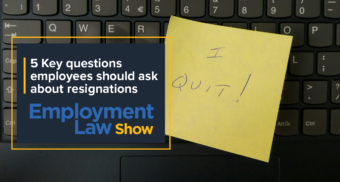5 Things to know if returning to the office from remote work | Employment Law Show TV – S6 E01
Episode Summary
5 THINGS TO KNOW IF RETURNING TO THE OFFICE FROM REMOTE WORK, non-compete clauses, severance for executives, and more on Season 6 Episode 01 of the Employment Law Show with employment lawyer Lior Samfiru, Partner at Samfiru Tumarkin LLP.
Watch above to discover your workplace rights and learn everything you need to know about employment law in Ontario, British Columbia, and Alberta, on the only employment law show on both TV and radio in Canada.
Episode Notes
Imposing mandatory vaccines at Work
My employer has said I have to be vaccinated by a certain date, and if I’m not I will be terminated. What can I do?
- Vaccine policies: Employers do not have the legal right to impose a mandatory vaccination policy unless there is a government mandate. Employers arguably are violating an employee’s human rights by imposing mandatory vaccines. Despite the fact that the policy may be illegal, employees cannot stop their employers from letting them go. Employees will have to decide whether or not they wish to be vaccinated or lose their job and pursue their severance or compensation.
- LEARN MORE
COVID-19 Knowledge Centre
- LEARN MORE
Severance owed to a senior sales executive
My wife’s employer is talking about letting her go with 7 months’ pay. She is a senior sales executive and has been with this company for 7 years but was with another company for 8 years before it was bought. How much is she owed?
- Severance calculations: Employees should remember that severance is based on a number of key factors, such as the age of an employee, the length of service as well as the position. Employees who have continued to work with a company after it has been sold to a new employer must have their previous years of work considered towards their entire length of employment. The length of service will contribute to an employee’s full severance entitlements. There are additional components to a severance package for senior executive roles that must be considered before accepting a company’s initial offer.
- LEARN MORE
• Severance Entitlements in Ontario
• Severance Pay in Alberta
• Severance Pay B.C.
- LEARN MORE
Looking for a job with a non-compete clause in the contract
My friend is going to start looking for new work because she recently learned that she will be fired soon. There are many companies in the area who would love to hire her, however, her employment contract contains a non-compete clause. What are her options?
- Employment contract terms: Employees should look closely at their agreements in order to determine whether or not there are clauses that can limit their future rights to severance and employment possibilities. In general, non-competition clauses are not enforceable as it limits an employee’s ability to work. Employees who believe they might have to breach a non-compete clause should communicate with their former employers and potentially make their new employers aware of the situation.
5 Things you need to know if returning to the office from remote work
- Return to the office or workplace: Employers are within their rights to ask their employees to return to the work arrangement prior to the pandemic even if they have worked remotely for the past year. Employers should ensure that public health regulations are being followed. Learn more about employee rights when employers end remote work and recall staff in provinces like Ontario, Alberta and British Columbia.
- Treated as a resignation: Employees who do not have a legitimate reason for their inability to return to the workplace, such as childcare or a medical condition, do have to return to work. A failure to return to the office can be considered a resignation.
- Forced to get vaccinated before you return to work: Employers do not have the ability to impose mandatory vaccinations in the workplace without the support of government legislation. Employers instead should continue to impose public health regulations such as social distancing and mask-wearing. Penalizing employees based on their vaccination status can be considered a human rights violation.
- Accept major changes to your job when you return: Despite the pandemic and the financial difficulties that some businesses now face, employers do not have the right to change the terms of employment without an employee’s consent. Major changes to employment can be a reduction in wages, hours or relocation. A fundamental change to the terms of employment can lead to constructive dismissal.
- You don’t have to wait on a temporary layoff: Employers do not have the right to lay an employee off without their consent or if it was not previously agreed upon as a term of employment. Employees who have been laid off can consider this a termination and pursue their severance entitlements.
Employer imposing relocation for employee
What happens if an employer is moving offices, and an employee doesn’t want to travel to the new location? Are they entitled to any severance?
- Major changes to an employee’s job: Relocation has to be considered significant in order for the change to be considered significant and a reason for constructive dismissal. If the distance and relocation have negatively impacted an employee significantly, they are within their rights to pursue constructive dismissal.
Formed a corporation but company determines schedule and pay
I was asked to form a corporation in order to work for a company. However, the company tells me when and where to work, pays me a percentage of my production, and had me sign a non-compete clause. Am I actually an employee?
- Misclassifications of employees: Employers often misclassify and label individuals as independent contractors instead of employees. Individuals should remember that their level of control dictates whether or not they are employees; such as whether or not they determine their own schedule, compensation, etc. Misclassification is significant as individuals could be prevented from accessing basic employee rights such as vacation pay, severance, etc.
Fired for cause after reacting to harassment from a coworker
I was fired for cause from my sales job after shoving a coworker who had been mocking my accent and culture for the past three years. My manager, who ignored my many complaints over the years, refuses to give me two weeks’ pay in severance.
- Terminated for cause: Employers often terminate an employee for cause when they are legally unable to do so. Termination for cause is difficult to prove and employers have to be able to establish disciplinary action towards an employee, as well as no possible alternative solutions other than termination. Employees who are terminated for cause have to have exhibited serious misconduct and one instance of bad behaviour is not typically enough for termination.
NEXT EPISODE: Employment Law Show S6 E02 – Severance package primer for Canadians
PREVIOUS EPISODE: Employment Law Show S5 E30 – What your employer legally can’t do Part 2




